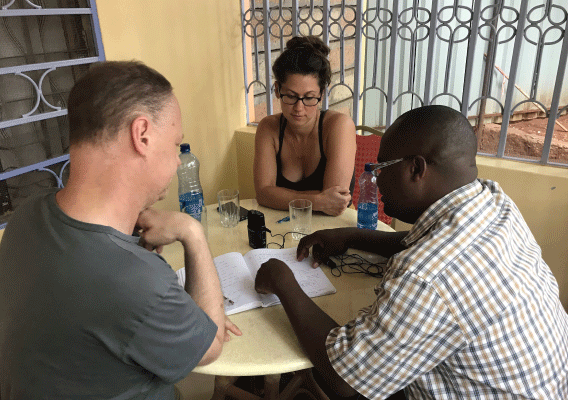Government Relations
Inside Grants: UK Economic and Social Research Council Research Grant
External grant funding can provide an essential source of support to psychological science, helping researchers to tackle bigger questions, recruit more participants, purchase key infrastructure, facilitate student training, and more. In APS’s “Inside Grants” column, you’ll hear about the emerging research these grants are supporting.
Grant Information
- Country United Kingdom
- Organization: UK Research and Innovation
- Council: Economic and Social Research Council
- Grant Mechanism: Research grant
- Amount: £405,256
The Economic and Social Research Council (ESRC) is one of the seven research councils, along with Innovate UK and Research England, that make up UK Research and Innovation, a nondepartmental public organization funded by the UK government. With a budget of more than £202 million, ESRC is the United Kingdom’s largest funder of social, behavioral, and economic research.
A core grant mechanism offered by ESRC is the research grant, which supports research projects, large-scale surveys, and methodological developments. Proposed projects can draw from the wider sciences, but the social sciences—defined by ESRC as disciplines that study society and the manner in which people behave and influence the world—must represent at least 50% of the research focus and effort.
Jennifer Culbertson, the director of the Centre for Language Evolution at the University of Edinburgh, received a research grant from ESRC in 2017 for the project “Connecting Cognitive Biases and Typological Universals in Syntax”. APS spoke with Culbertson regarding her research, her grant, and more.

Jennifer Culbertson
What research are you currently conducting?
My research uses experimental methods, mainly from developmental psychology, to study how humans learn language. I’m particularly interested in understanding the relationship between human learning and commonalities we see across languages. For example, my ESRC grant grew out of work I did showing that learners consistently infer particular word-order rules in an artificial language, even if they are not explicitly taught those rules. These same rules crop up again and again across languages, and this work suggests that something about how humans learn shapes them. This finding was limited, however, in that it targeted only English-speaking learners. The grant aims to extend it to a diverse set of populations, including a non-WEIRD (Western, educated, industrialized, rich, democratic) population in rural Kenya. We’re really excited about what this population can tell us about universal preferences across learners, but the data collection process is very tricky and has been delayed by COVID-19, unfortunately.
Talk about how psychological science informs your research process. How has ESRC funding helped support this aspect of your research?
I was trained as a cognitive scientist, so from the beginning of my research career I’ve always been interested in pursuing interdisciplinary questions and using a multidisciplinary toolbox of methods. It’s important to me that my research be framed in broad terms as addressing questions about the psychological underpinnings of human language. But beyond that, I draw inspiration from psychology in the set of methods I use to tackle these questions. My ESRC grant, for example, has as one of its overarching goals to generate new sources of evidence for linguistics using tools from psychology. I think psychologists have been really creative in coming up with methods, and linguistics can and should benefit from that. On a more practical note, I’ve also been heavily influenced by the open science movement that has grown out of issues with reproducibility in the sciences (including psychology).

How has government funding supported your research efforts?
This grant has allowed me to put together an amazing team to conduct research in three different countries. This would have been impossible without government funding. While the University of Edinburgh offers staff some funds for conducting research, we do not typically get large start-up packages, so grant funding is particularly critical for early-career researchers. The ESRC is one of a relatively short list of funders of basic social science research in the United Kingdom.
What was the application process like?
The application process was a long one for me. I first put in the application in the fall of 2015 and didn’t start the grant until the beginning of 2017. This included two rounds of evaluation by outside reviewers and a panel and two response letters on my part (somewhat unusual, I think). But I didn’t find the paperwork to be all that onerous. The main challenge was to communicate the substance of the grant in a convincing way and stretch myself to consider how to increase the impact of the work beyond academia.
Read more about the ESRC research grant here.
Interested in learning more about funding opportunities for psychological scientists? Visit the Funding and Policy page.
What advice do you have for researchers applying for grants from ESRC?
I would say that the most important thing is to be able to communicate why your research is important to a broad audience. It seems obvious, but we sometimes take for granted that others in our general subject area will know or understand what makes our research questions important. It’s not true. Getting others excited about our work is hard but absolutely crucial, and frankly I think it also helps us clarify to ourselves what the most important aspects are. Beyond that, look at the evaluation criteria and make sure you are addressing them all in a way that reviewers and panel members can see clearly.
Feedback on this article? Email [email protected] or post a comment.



APS regularly opens certain online articles for discussion on our website. Effective February 2021, you must be a logged-in APS member to post comments. By posting a comment, you agree to our Community Guidelines and the display of your profile information, including your name and affiliation. Any opinions, findings, conclusions, or recommendations present in article comments are those of the writers and do not necessarily reflect the views of APS or the article’s author. For more information, please see our Community Guidelines.
Please login with your APS account to comment.